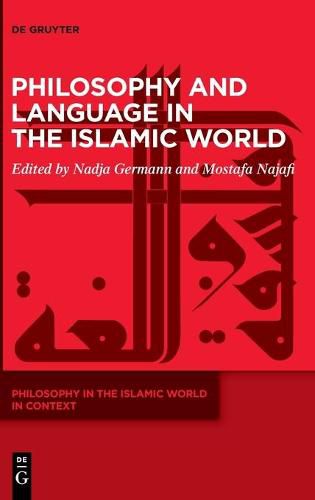Readings Newsletter
Become a Readings Member to make your shopping experience even easier.
Sign in or sign up for free!
You’re not far away from qualifying for FREE standard shipping within Australia
You’ve qualified for FREE standard shipping within Australia
The cart is loading…






This title is printed to order. This book may have been self-published. If so, we cannot guarantee the quality of the content. In the main most books will have gone through the editing process however some may not. We therefore suggest that you be aware of this before ordering this book. If in doubt check either the author or publisher’s details as we are unable to accept any returns unless they are faulty. Please contact us if you have any questions.
What is language? How did it originate and how does it work? What is its relation to thought and, beyond thought, to reality? Questions like these have been at the center of lively debate ever since the rise of scholarly activities in the Islamic world during the 8th/9th century. However, in contrast to contemporary philosophy, they were not tackled by scholars adhering to only one specific discipline. Rather, they were addressed across multiple fields and domains, no less by linguists, legal theorists, and theologians than by Aristotelian philosophers.
In response to the different challenges faced by these disciplines, highly sophisticated and more specialized areas emerged, comparable to what nowadays would be referred to as semantics, pragmatics, and hermeneutics, to name but a few - fields of research that are pursued to this day and still flourish in some of the traditional schools. Philosophy of language, thus, has been a major theme throughout Islamic intellectual culture in general; a theme which, probably due to its trans-disciplinary nature, has largely been neglected by modern research.
This book brings together for the first time experts from the various fields involved, in order to explore the riches of this tradition and make them accessible to a broader public interested both in philosophy and the history of ideas more generally.
$9.00 standard shipping within Australia
FREE standard shipping within Australia for orders over $100.00
Express & International shipping calculated at checkout
This title is printed to order. This book may have been self-published. If so, we cannot guarantee the quality of the content. In the main most books will have gone through the editing process however some may not. We therefore suggest that you be aware of this before ordering this book. If in doubt check either the author or publisher’s details as we are unable to accept any returns unless they are faulty. Please contact us if you have any questions.
What is language? How did it originate and how does it work? What is its relation to thought and, beyond thought, to reality? Questions like these have been at the center of lively debate ever since the rise of scholarly activities in the Islamic world during the 8th/9th century. However, in contrast to contemporary philosophy, they were not tackled by scholars adhering to only one specific discipline. Rather, they were addressed across multiple fields and domains, no less by linguists, legal theorists, and theologians than by Aristotelian philosophers.
In response to the different challenges faced by these disciplines, highly sophisticated and more specialized areas emerged, comparable to what nowadays would be referred to as semantics, pragmatics, and hermeneutics, to name but a few - fields of research that are pursued to this day and still flourish in some of the traditional schools. Philosophy of language, thus, has been a major theme throughout Islamic intellectual culture in general; a theme which, probably due to its trans-disciplinary nature, has largely been neglected by modern research.
This book brings together for the first time experts from the various fields involved, in order to explore the riches of this tradition and make them accessible to a broader public interested both in philosophy and the history of ideas more generally.